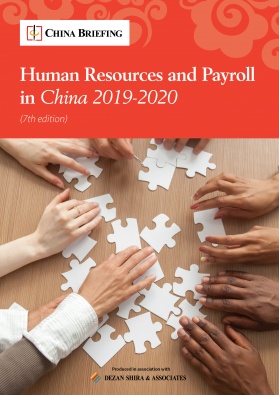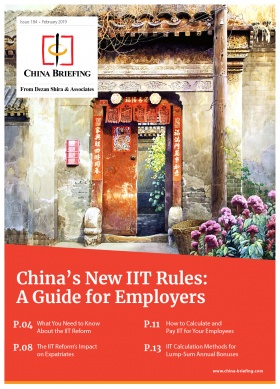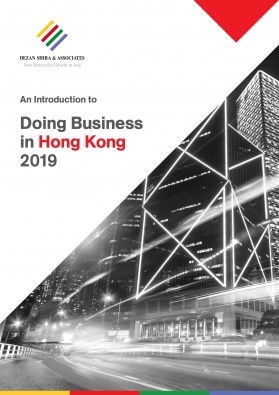Greater Bay Area Releases Detailed Plan on IIT Incentives for Overseas Talents
The Greater Bay Area officially announced detailed rules for the implementation of preferential individual income tax (IIT) policy for overseas talents.
Eligible overseas talents working in nine cities in the region can enjoy a preferential tax rate of 15 percent – in line with the Hong Kong IIT rate. China Briefing explains the policy introduced.
To support the smooth implementation of the Guangdong-Hong Kong-Macau Greater Bay Area (GBA) plan and attract overseas talents to work in this region, China has rolled out measures to grant subsidies to overseas high-end and critically-lacking talents (including Hong Kong, Macau, and Taiwanese residents or “HKMT residents”).
On March 14, 2019, China’s Ministry of Finance (MOF) and State Administration of Taxation (SAT) jointly released Cai Shui [2019] No.31 (“Circular 31”). The circular allows eligible overseas talents to receive government subsidies to offset differences in the individual income tax (IIT) burden between mainland China and other regions. The plan will last for five years and end on December 31, 2023.
On June 22, Guangdong province released Yue Cai Sui [2019] No.2 (“GD Notice 2”), which sets out the main criteria and principles for implementing the preferential IIT policy, including the requirements of applicants and the standard and scope of differential subsidies.
The “GD Notice 2” will be retroactively implemented from January 1, 2019 for a trial period of one year. Although the notice itself was announced in June, the subsidy will be calculated based on the taxable income for one year, from January 1 to December 31, 2019.
What’s the subsidy and how to calculate it?
The subsidy will apply to nine cities across the Greater Bay Area: Guangzhou, Shenzhen, Zhuhai, Foshan, Huizhou, Dongguan, Zhongshan, Jiangmen, and Zhaoqing.
The local governments of these nine cities will provide the subsidies for eligible talents working in the respective city; the subsidies will absorb the IIT difference between the mainland and Hong Kong, which enjoys a lower income tax rate.
The IIT system of Hong Kong currently adopts a five-level progressive rate (two, six, 10, 14, or 17 percent) or a standard rate (15 percent). For the convenience of practical operation, the Chinese government will use the standard tax rate of 15 percent. Thus, the actual amount of IIT that the eligible person needs to pay will be 15 percent of their taxable income.
Therefore, to calculate the IIT difference or the amount of subsidy, the formula is:
The subsidy amount = the amount of IIT paid in those nine cities – taxable income × 15%
Based on this formula, Shenzhen’s vice mayor Wang Lixin gave a rough estimate that a talent with an annual salary of RMB 1 million (US$150,000), who would have paid IIT of up to RMB 450,000 (US$65,573) in the mainland, may now only need to pay IIT of RMB 150,000 (US$21,858).
What is considered taxable income under the IIT policy?
Pursuant to the “GD Notice 2”, the IIT paid in the nine cities cover:
- Salaries and wages;
- Income from provision of independent person services;
- Income from author’s remuneration;
- Income from royalties;
- Income from operations; and
- Subsidized income from selected talent projects or talent programs.
To clarify the IIT payment of overseas talents (including “HKMT residents”), you can refer to our guide on China’s IIT rules to understand rules on foreign workers’ tax residency in China and the IIT calculation methods, or refer to the government’s original documents – Announcement 34 (Announcement on the Criteria for Determining the Residence Time of Individuals without Domicile in China) and Announcement 35 (Announcement on Individual Income Tax Policies for Non-resident Individuals and Non-domiciled Resident Individuals).
Who are eligible?
Overseas talents working in the above-mentioned nine cities and paying taxes as required by law in the local city are eligible for the subsidy. They may be:
- Permanent residents of Hong Kong or Macau;
- Hong Kong residents who came to Hong Kong through the Hong Kong entry scheme for talents, professionals, and entrepreneurs;
- Residents of Taiwan;
- Foreign nationalities; or
- Overseas students and overseas Chinese who have obtained the right of long-term residence abroad.
Moreover, applicants need to fit the basic definition of “high-end” and “critically-lacking” talents according to the “GD Notice 2”. They should be:
- A candidate of the state, provincial, or municipal major talent projects who has obtained a high-level talent’s card of Guangdong province or a Foreigner’s Work Permit (Class A) or a confirmation letter of a foreign high-end talent, as well as other overseas high-end talents recognized by the state, provincial, and municipal authorities; or
- A scientific and research team member of a major innovation platform of the state, provincial, or municipal level, or of a higher education institution, scientific and research institution, hospitals, or other relevant institutions, or a technical skills backbone and an excellent managerial personnel working or starting out his/her own business in a key industry or a key field within the Guangdong Province, or any other critically lacking talent with special expertise recognized by the nine municipal authorities within the GBA.
More specific identification standards and operative measures are left to the nine municipal governments to formulate, according to their respective local conditions.
The applicant or employer can submit the application to the local financial department once the application procedures are announced.
If approved, the subsidy will be consolidated and granted to the talent once a year. If a talent obtains the subsidies from two or more places, such subsidies shall be reasonably shared by the relevant local governments.
The eligible talents and their employers are advised to monitor the follow-up local notices and apply for the subsidies in time after the practical measures are introduced.
(Update: See here for Notice of Guangzhou Municipality on the Interim Measures for the Administration of Financial Subsidy for Personal Income Tax Preferential Policies in Guangdong, Hong Kong, and Macao Dawan District, released on August 13, 2019.)
Editor’s Note: This article was originally published on July 3, and has been updated as per latest developments.
About Us
China Briefing is produced by Dezan Shira & Associates. The firm assists foreign investors throughout Asia from offices across the world, including in Dalian, Beijing, Shanghai, Guangzhou, Shenzhen, and Hong Kong. Readers may write to china@dezshira.com for more support on doing business in China.
- Previous Article What You Need to Know about China’s New IIT Regime
- Next Article What is the Real Size of the US-China Trade Deficit?









